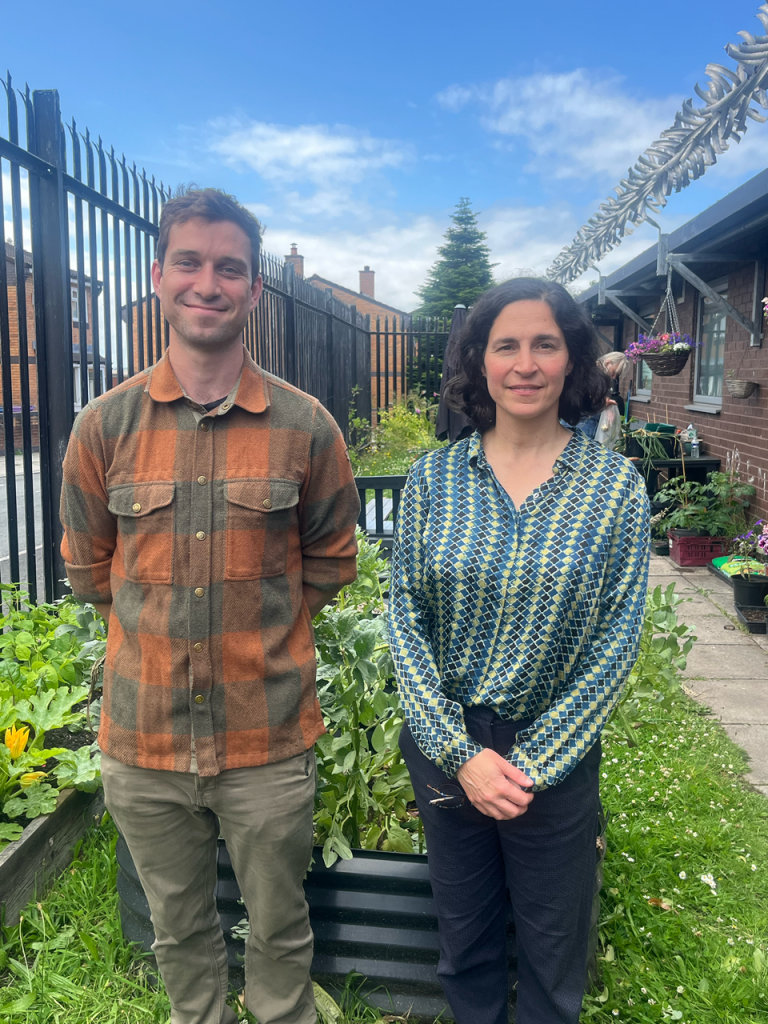Vauxhall Health Centre in north Liverpool is a good example of how a small amount of financial support from Kindred and peer support from the STO community has embedded a vital idea what tackles, health, wellbeing and loneliness.
In north Liverpool, Vauxhall Health Centre (VHC) has set up a community garden for its patients, staff and volunteers, with support from Kindred. “We put a simple proposal to the partners, knowing that Kindred would match it,” says Dr Barry Green, one of two GPs at the practice with responsibility for the garden.
This microgranting model allows Kindred to support community activity to try new ideas, with STOs providing peer support and expertise though the social prescribing cluster.
The money was enough to start the practice with a bench, storage, a greenhouse and two raised beds and it began advertised for volunteers – four or five regulars now tend to the garden on a weekly basis.
Kindred recommended a connection with Bootle-based Gateway Collective, which has provided a range of expertise and events. “It’s a good model for any new startup project to be linked with an established community garden – with people who know what they’re doing and their expertise,” says Barry. “Ali or Jan [from Gateway] came every month through the winter to do a seasonal workshop, whether it was jam making or apple pressing, seed bombs or Christmas wreath making. It really tied everything together.”
The garden’s volunteers are a mixture of patients and local community members. “It’s particularly aimed at patients,” says Barry – “to get them out in nature; hands in the soil and knowing about what healthy food is. Plus all the benefits of green space – community, socialisation and specific health benefits. There are also gains for staff morale and even people walking past, to see a flower in an area where there’s not very much green space. The tree equity score around here is about 35 out of 100.”

Now, VHC is starting to build links with other organisations, including the NHS Forest, which helps healthcare sites to transform their green space for health, wellbeing and biodiversity, the Mersey Forest and Myerscough College (through gardener Nina Dale) and its local primary school, whose students comes to play games and learn more about the natural world. The League of Welldoers, next door, is Liverpool’s oldest independent charity. “We’re networking with other local support groups,” says Barry, “so we’re trying to tie it all together locally, with walking groups. It’s a way to help us talk to each other effectively.”
The garden is full of familiar products – “things people will eat: onions, beans, peas, tomatoes, potatoes… We grew kohlrabi last year,” he says. “And we have plans for a green wall with jasmine, passion flower and clematis. Community growing spaces reduce pollution, run-off and the urban heat effect.”
Barry’s colleague, Dr Nadja van Ginneken, is a GP at the practice and is responsible for sustainability across Central Liverpool Primary Care Network (PCN). “We know there are potential wider community impacts – not just for North Liverpool, but across Liverpool City Region and Cheshire,” she says. “For us, it fits with the prevention pledge and the ‘anchor framework’, which looks at how practices can best deliver not just day-to-day care, but do the best for the communities that they’re living in.”
Five other practices within the PCN have now also set up gardens, and Nadja has accessed funding through Liverpool John Moores University and organised a collaboration with Liverpool City Council. “In Liverpool, there’s no other surgery doing this except the ones that we’ve networked through,” she admits. “Some have been donated trees from the NHS Forest – but no-one else has yet set up a garden with a gardening group. Suddenly, things like this start to knit things together and join some dots,” she says.
Kindred has also supported the team to create a toolkit to share with other practices, to help them get gardens started. “To have a community garden for patients to go and exercise and spend time is great,” says Barry. “We’ve made a little logo called Growing Health, Liverpool. So hopefully other practises – and we’ve got a few in our network – will sign up. It has to be an organic thing.”
“We’re running sustainability walks, called the Vauxhall Ventures,” adds Nadja. “It’s a walking group for patients that started a few weeks ago with the health coach here. And there’s tea and toast that happens here on a Friday – that’s mainly been indoors so far, so we’re going to encourage them to come outdoors
as well.”
Feedback from patients – while in its early days – has been overwhelmingly positive, supporting community events and practice open days. The PCN’s impact prompted a bid to the regional Integrated Care Board, with Greener NHS providing £20,000 to start ten pilot projects across the region last year: “Not just gardens, but asthma, de-prescribing and period poverty projects,” says Nadja. “One of those pilots, in Tuebrook, has been able to show people reversing their diabetes – coming off medicines because they’ve cured their diabetes with this approach, in just six months. The results have been fantastic. It’s a very bottom-up approach.”